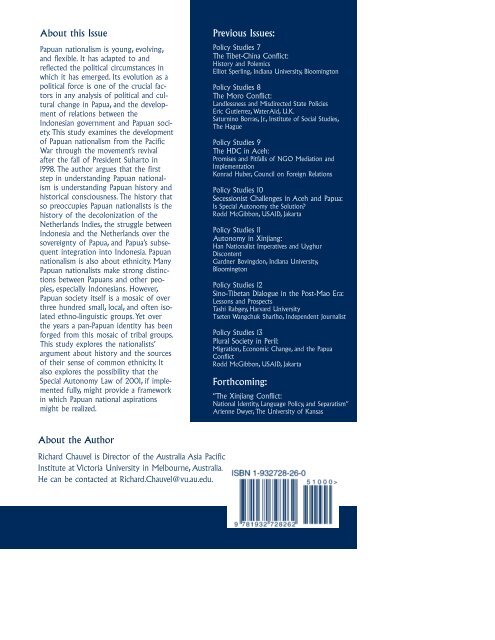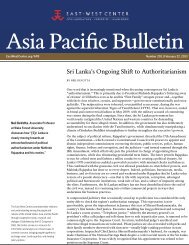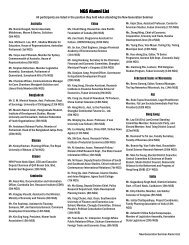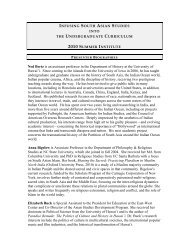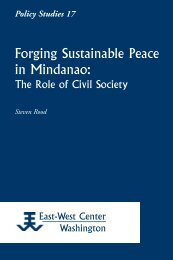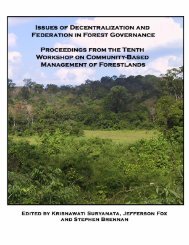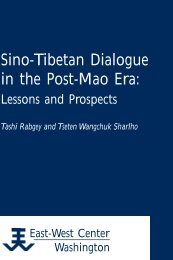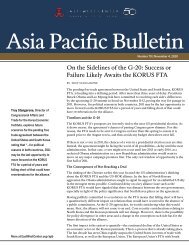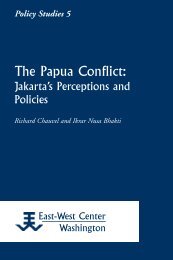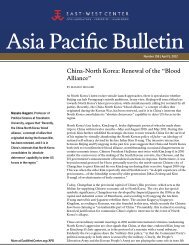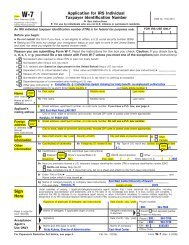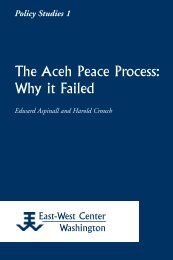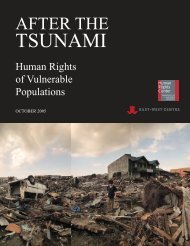Constructing Papuan Nationalism: History, Ethnicity ... - ScholarSpace
Constructing Papuan Nationalism: History, Ethnicity ... - ScholarSpace
Constructing Papuan Nationalism: History, Ethnicity ... - ScholarSpace
- No tags were found...
Create successful ePaper yourself
Turn your PDF publications into a flip-book with our unique Google optimized e-Paper software.
About this Issue<strong>Papuan</strong> nationalism is young, evolving,and flexible. It has adapted to andreflected the political circumstances inwhich it has emerged. Its evolution as apolitical force is one of the crucial factorsin any analysis of political and culturalchange in Papua, and the developmentof relations between theIndonesian government and <strong>Papuan</strong> society.This study examines the developmentof <strong>Papuan</strong> nationalism from the PacificWar through the movement’s revivalafter the fall of President Suharto in1998. The author argues that the firststep in understanding <strong>Papuan</strong> nationalismis understanding <strong>Papuan</strong> history andhistorical consciousness. The history thatso preoccupies <strong>Papuan</strong> nationalists is thehistory of the decolonization of theNetherlands Indies, the struggle betweenIndonesia and the Netherlands over thesovereignty of Papua, and Papua’s subsequentintegration into Indonesia. <strong>Papuan</strong>nationalism is also about ethnicity. Many<strong>Papuan</strong> nationalists make strong distinctionsbetween <strong>Papuan</strong>s and other peoples,especially Indonesians. However,<strong>Papuan</strong> society itself is a mosaic of overthree hundred small, local, and often isolatedethno-linguistic groups. Yet overthe years a pan-<strong>Papuan</strong> identity has beenforged from this mosaic of tribal groups.This study explores the nationalists’argument about history and the sourcesof their sense of common ethnicity. Italso explores the possibility that theSpecial Autonomy Law of 2001, if implementedfully, might provide a frameworkin which <strong>Papuan</strong> national aspirationsmight be realized.Previous Issues:Policy Studies 7The Tibet-China Conflict:<strong>History</strong> and PolemicsElliot Sperling, Indiana University, BloomingtonPolicy Studies 8The Moro Conflict:Landlessness and Misdirected State PoliciesEric Gutierrez, WaterAid, U.K.Saturnino Borras, Jr., Institute of Social Studies,The HaguePolicy Studies 9The HDC in Aceh:Promises and Pitfalls of NGO Mediation andImplementationKonrad Huber, Council on Foreign RelationsPolicy Studies 10Secessionist Challenges in Aceh and Papua:Is Special Autonomy the Solution?Rodd McGibbon, USAID, JakartaPolicy Studies 11Autonomy in Xinjiang:Han Nationalist Imperatives and UyghurDiscontentGardner Bovingdon, Indiana University,BloomingtonPolicy Studies 12Sino-Tibetan Dialogue in the Post-Mao Era:Lessons and ProspectsTashi Rabgey, Harvard UniversityTseten Wangchuk Sharlho, Independent JournalistPolicy Studies 13Plural Society in Peril:Migration, Economic Change, and the PapuaConflictRodd McGibbon, USAID, JakartaForthcoming:“The Xinjiang Conflict:National Identity, Language Policy, and Separatism”Arienne Dwyer, The University of KansasAbout the AuthorRichard Chauvel is Director of the Australia Asia PacificInstitute at Victoria University in Melbourne, Australia.He can be contacted at Richard.Chauvel@vu.au.edu.


